  Ursula's History Web Ursula's History Web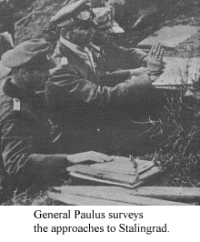 During
the Second World War, Stalingrad was the most drawn-out bitter battle
on the eastern front. The Russian resistance had crumbled badly under
the impact of the Blitzkrieg. It was Russia’s weakest hour
and fortunately for Russia, Hitler split his effort between the
Caucasus and Stalingrad on the river Volga, gateway to the north and
the Urals. The first attacks on Stalingrad by General
Paulus’s 6th Army were narrowly checked in mid July 1942.
Hitler increasingly weakened his forces in the Caucasus to reinforce
the attack on Stalingrad. He became obsessed with the "City of Stalin",
and could not bear to be defeated by it. Although the Russian positions
there came to look more and more desperate, the resistance hardened
under the steady hammering of the city. The most critical time was on
October 14th, when the Russians had their back to the Volga. But
beneath the surface, basic factors were working in the
Russian’s favor. The morale of the German attackers was being
sapped by their heavy losses, and a growing sense of frustration set in
that the Russians were preparing for a counter-offensive. During
the Second World War, Stalingrad was the most drawn-out bitter battle
on the eastern front. The Russian resistance had crumbled badly under
the impact of the Blitzkrieg. It was Russia’s weakest hour
and fortunately for Russia, Hitler split his effort between the
Caucasus and Stalingrad on the river Volga, gateway to the north and
the Urals. The first attacks on Stalingrad by General
Paulus’s 6th Army were narrowly checked in mid July 1942.
Hitler increasingly weakened his forces in the Caucasus to reinforce
the attack on Stalingrad. He became obsessed with the "City of Stalin",
and could not bear to be defeated by it. Although the Russian positions
there came to look more and more desperate, the resistance hardened
under the steady hammering of the city. The most critical time was on
October 14th, when the Russians had their back to the Volga. But
beneath the surface, basic factors were working in the
Russian’s favor. The morale of the German attackers was being
sapped by their heavy losses, and a growing sense of frustration set in
that the Russians were preparing for a counter-offensive.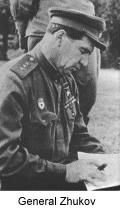 This
counter-offensive was launched on November 19th. Wedges were driven
into the flanks at several places, so as to isolate the 6th Army. By
the 23rd the encirclement was complete, more than a quarter of a
million German and Allied troops were cut off. Hitler would not permit
any withdrawal, and all attempts to relieve were repulsed in December.
Air supply was inadequate; even then Hitler was reluctant to permit the
6th Army to try a breakout westward before it was too late. In January
General Paulus was forced to surrender with the remnants of his
near-starving, half-frozen, completely exhausted army. It was as if
Stalin, with his passion for secrecy, had managed to conceal not only
the strength of the Red Army’s reserves, but also the
severity of the Russian winter. Many of the German Generals had been
opposed to the invasion of the Soviet Union, especially with the
British in their back and the likelihood that Britain would in due time
provide the bases for an invasion of the Continent. This
counter-offensive was launched on November 19th. Wedges were driven
into the flanks at several places, so as to isolate the 6th Army. By
the 23rd the encirclement was complete, more than a quarter of a
million German and Allied troops were cut off. Hitler would not permit
any withdrawal, and all attempts to relieve were repulsed in December.
Air supply was inadequate; even then Hitler was reluctant to permit the
6th Army to try a breakout westward before it was too late. In January
General Paulus was forced to surrender with the remnants of his
near-starving, half-frozen, completely exhausted army. It was as if
Stalin, with his passion for secrecy, had managed to conceal not only
the strength of the Red Army’s reserves, but also the
severity of the Russian winter. Many of the German Generals had been
opposed to the invasion of the Soviet Union, especially with the
British in their back and the likelihood that Britain would in due time
provide the bases for an invasion of the Continent.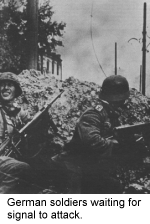 The
Generals dreaded the fight on two fronts, but all objections fell on
Hitler’s deaf ears. In the summer and autumn of 1941
Stalin’s regime has withstood shocks greater than the ones
which had toppled the regime of the Tsar in the First World War. But
the Russians had a marked Achilles’ heel, in that Soviet oil
was mainly in the Caucasus. If this region was crossed and Baku
captured it would turn Germany’s wheels and make it possible
for her to withstand a prolonged war, without having to depend on
Romanian oilfields, which were vulnerable to attacks by Soviet bombers
from the Crimea. These were persuasive reasons for Hitler to place
emphasis of the 1942 campaign in the south. Germany's forces were
already considerably extended in maintaining the existing front lines
after the losses of the winter battles. A drive southeastward against
the Caucasus would extend the front line even more. The possibility
existed that the Germans would either be cut off or would have to make
a hasty retreat out of the Caucasus. Therefore, it was necessary to set
up a flank and rear guard to cover them against this danger, bearing in
mind that Germany’s forces were stretched. The
Generals dreaded the fight on two fronts, but all objections fell on
Hitler’s deaf ears. In the summer and autumn of 1941
Stalin’s regime has withstood shocks greater than the ones
which had toppled the regime of the Tsar in the First World War. But
the Russians had a marked Achilles’ heel, in that Soviet oil
was mainly in the Caucasus. If this region was crossed and Baku
captured it would turn Germany’s wheels and make it possible
for her to withstand a prolonged war, without having to depend on
Romanian oilfields, which were vulnerable to attacks by Soviet bombers
from the Crimea. These were persuasive reasons for Hitler to place
emphasis of the 1942 campaign in the south. Germany's forces were
already considerably extended in maintaining the existing front lines
after the losses of the winter battles. A drive southeastward against
the Caucasus would extend the front line even more. The possibility
existed that the Germans would either be cut off or would have to make
a hasty retreat out of the Caucasus. Therefore, it was necessary to set
up a flank and rear guard to cover them against this danger, bearing in
mind that Germany’s forces were stretched. 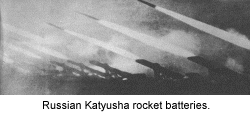 Her
allies, Romania, Italy and Hungary, with their relatively poorly
equipped, badly trained and doubtfully enthusiastic forces, would have
to take part in such an operation. One of the Generals said after the
war "At the start Stalingrad was no more than a name on the map for
us." But it became more and more the natural place to anchor the
eastern end of the flank at the Volga in the Stalingrad area. The bulk
of the German Army consisted of drafted soldiers, who dreaded to be
sent to the Russian front. They knew how tenacious the Russians would
defend their homeland. They offensive against this vast country had
begun on June 22, 1941, and Hitler with his warped mind believed that
this country could be defeated before the onset of winter. All the
soldiers of the German Army were clad in summer uniforms, and as time
went on, the weather turned cold in early fall. Her
allies, Romania, Italy and Hungary, with their relatively poorly
equipped, badly trained and doubtfully enthusiastic forces, would have
to take part in such an operation. One of the Generals said after the
war "At the start Stalingrad was no more than a name on the map for
us." But it became more and more the natural place to anchor the
eastern end of the flank at the Volga in the Stalingrad area. The bulk
of the German Army consisted of drafted soldiers, who dreaded to be
sent to the Russian front. They knew how tenacious the Russians would
defend their homeland. They offensive against this vast country had
begun on June 22, 1941, and Hitler with his warped mind believed that
this country could be defeated before the onset of winter. All the
soldiers of the German Army were clad in summer uniforms, and as time
went on, the weather turned cold in early fall.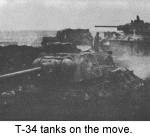 The
same misfortune befell them as Napoleons Grand Armee. They too were not
prepared for the harsh Russian winter. And Hitler had grossly
underestimated the ability and the resolve of the Red Army to rally its
forces. An unlimited amount of manpower was mobilized in surprisingly
short time and thrown against the invaders. Vast Russian forces,
infantry, light amour and squadrons of T 34s were brought up for the
battles. Altogether the force comprised over one million men, with
thirteen thousand five hundred and forty-one guns and mortars, eight
hundred and ninety four tanks and one thousand one hundred and fifteen
aircraft. The German High Command had only been dimly aware of the
existence of such a force. That is was recognized too late was a
tribute to Red Army security and skill in deception, and a reproach to
the intelligence services of Hitler and his generals, but it also
contained an element of luck. The total Axis forces in the area too
numbered over a million, but it was in tanks and guns that the Russians
had a clear edge. With this in mind, the Russian General in Command,
Zhukov, concentrated his tanks and guns and aircraft against the
Romanian forces on the river Don and on the Romanian forces west of the
lakes south of Stalingrad. These Romanian armies were known to be
poorly equipped, disgruntled and often on bad terms with the Germans.
But the shortage of German troops made it necessary to seek the
Romanian contribution. The
same misfortune befell them as Napoleons Grand Armee. They too were not
prepared for the harsh Russian winter. And Hitler had grossly
underestimated the ability and the resolve of the Red Army to rally its
forces. An unlimited amount of manpower was mobilized in surprisingly
short time and thrown against the invaders. Vast Russian forces,
infantry, light amour and squadrons of T 34s were brought up for the
battles. Altogether the force comprised over one million men, with
thirteen thousand five hundred and forty-one guns and mortars, eight
hundred and ninety four tanks and one thousand one hundred and fifteen
aircraft. The German High Command had only been dimly aware of the
existence of such a force. That is was recognized too late was a
tribute to Red Army security and skill in deception, and a reproach to
the intelligence services of Hitler and his generals, but it also
contained an element of luck. The total Axis forces in the area too
numbered over a million, but it was in tanks and guns that the Russians
had a clear edge. With this in mind, the Russian General in Command,
Zhukov, concentrated his tanks and guns and aircraft against the
Romanian forces on the river Don and on the Romanian forces west of the
lakes south of Stalingrad. These Romanian armies were known to be
poorly equipped, disgruntled and often on bad terms with the Germans.
But the shortage of German troops made it necessary to seek the
Romanian contribution.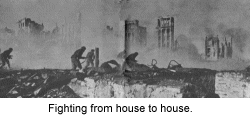 Anyway,
Hitler was not too disposed to take Romanian anxieties seriously. But
he did agree to make tank and anti-tank forces available to them and
ordered XLVIII Panzer Corps into the sector on November 10th. Since
September it had been inactive and because of fuel shortage many of the
tank engines had not been started for over two months. The tanks had
been dug in, camouflaged and protected against the frost with straws
and reeds. When the German division was ordered to take to the road,
sixty-five of its hundred and four tanks could not be started. Even
after intensive work only forty-two could be put in running order. The
straw had attracted mice, and the mice went into the tanks to look for
food and feasted on the insulation covering the electrical wiring. When
the tanks started up short circuits developed in their electrical
systems, and several of them were set on fire by sparks. Anyway,
Hitler was not too disposed to take Romanian anxieties seriously. But
he did agree to make tank and anti-tank forces available to them and
ordered XLVIII Panzer Corps into the sector on November 10th. Since
September it had been inactive and because of fuel shortage many of the
tank engines had not been started for over two months. The tanks had
been dug in, camouflaged and protected against the frost with straws
and reeds. When the German division was ordered to take to the road,
sixty-five of its hundred and four tanks could not be started. Even
after intensive work only forty-two could be put in running order. The
straw had attracted mice, and the mice went into the tanks to look for
food and feasted on the insulation covering the electrical wiring. When
the tanks started up short circuits developed in their electrical
systems, and several of them were set on fire by sparks.In the mean time, Russian patrols reported that General Paulus was regrouping. Clearly the German offensive would begin soon and on November 11th at 0630 hours Paulus began his last attempt to capture the city of Stalingrad. Seven divisions (XIV and XXIV Panzer, 100th Light, 44th, 79th, 305th and 389th Infantry) with elements of 161st and 294th brought in by air. They were surprisingly strong, as most of them had been in battles in the previous weeks. The Russian troops met them head-on. After five hours of grim, close distance combat, Paulus committed the tactical reserve, overrunning the 95th Russian division and reaching the river Volga. The defenders knew that it was General Paulus’ last attempt. The support of the Luftwaffe was inferior, still, the Russians suffered heavy casualties, but they could see that the end was near. On the evening of November 12th the German attack let up. The Russian Commander Zhukov arranged for radio calls to tell him that help was on the way, but it was a bluff for German ears. Everywhere in the city began the counter attack, block by block, house by house, room by room. Slowly the tide began to turn. The encirclement of the dying city was complete, but the vicious battle raged on. When General Paulus ask for permission to try a breakout, Hitler told him " Where the German soldier stands, he remains." The Russians decided to make an offer of honorable capitulation. On January 8th they sent representatives to the German lines under a flag of truce. The Germans were handed a paper on which it read: "To the Commander of VI Army surrounded at Stalingrad, Colonel-General Paulus, or his representative. The VI German Army, formations of VI Panzer Army, and attached units have been completely encircled since November 23rd, 1942. Units of the Red Army have surrounded this group of German forces with a solid ring. All hopes of rescue of your forces from the South and Southwest have proved unjustified. The German forces, which hastened to your aid, have been smashed by the Red Army. The German transport Air force, which is bringing you starvation rations of food, ammunition and fuel, has been compelled to change its airfields frequently because of the swift advance of the Red Army. The situation of the encircled troops is serious. They are suffering hunger, sickness and cold. The severe Russian winter is only beginning; hard frosts, cold winds and blizzards are still to come. Your soldiers have not been provided with winter uniforms and find themselves in severe, unhealthy conditions. You, as the Commander, and all officers of the encircled forces understand very well that you have no chance of breaking through the ring of encirclement. Your situation is hopeless and further resistance is completely pointless. We propose that you accept the following terms of capitulation: 1. All encircled German forces headed by you and your staff to cease resistance. 2. You to hand over to us all personnel, armaments, all military equipment and all military property in working order. We guarantee to all officers, non-commissioned officers, and all men who cease resistance, their lives and safety, and after the end of the war return to Germany or to any other country to which the prisoners desire to go. All members of forces which surrender may retain their military uniform, badges of rank and medals, personal effects, valuables, and in the case of senior officers, their swords. Normal rations will be instituted immediately for all officers and men who surrender. Medical aid will be given to all wounded, sick and frostbitten. Your reply is expected at 1500 hours Moscow time on January 9th, 1943 in written form by a representative personally appointed by you. Driving in a light vehicle with a white flag, your representative will be met by Russian officers in area B, 500 meters southeast of siding 564. In the event our proposal for capitulation is refused by you, we warn you that the forces of the Red Army and Red Air Fleet will be compelled to take the matter to annihilation of the encircled German forces, and for their destruction you will bear the responsibility." However agreeable these terms were, General Paulus did not yet give up. It must be said here, that the offer was made at all is most surprising. But Red Army’s senior officers had a healthy respect for the German soldier. Hitler constantly demanded miracles from his troops and frequently got them. The ultimatum with its promise of food and medical treatment contained an echo of the surrender terms given to General Robert E. Lee at Appomattox in 1865. In any case, Operation "Ring" was to go forward. 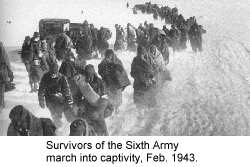 Once
more the tortured earth of Stalingrad heaved under the explosion of
bombs and shells. Even so, it was not expected that the Russian
onslaught could be halted. On the evening of the 17th the Germans were
back in the inner perimeter of the city, and an uneasy lull lay over
the area as the Russians regrouped. Field Marshall Erich von Manstein
made it his first priority to reestablish contact from Army Group Don
with the cut-off 6th Army, but was soon overruled by Hitler. Manstein
feared that the whole southern front was endangered as long as its
effort was concentrated in the Don bend and unless the 6th Army could
break out and be employed elsewhere. He made a last attempt by
telephone to persuade Hitler to allow the surrender, but it was in
vain. Coldly, Hitler sent the men of VI Army to its doom. After the
final surrender, only ninety-one thousand of the three hundred and
thirty thousand survived. When it was all over, one hundred and
forty-seven thousand two hundred German soldiers were dead as well as
forty-six thousand seven hundred Russians. Of the ninety-one thousand
who surrendered, only five thousand ever saw Germany again. A typhoid
epidemic killed about fifty thousand of the feeble survivors. The last
prisoners of war returned to Germany in 1955. Once
more the tortured earth of Stalingrad heaved under the explosion of
bombs and shells. Even so, it was not expected that the Russian
onslaught could be halted. On the evening of the 17th the Germans were
back in the inner perimeter of the city, and an uneasy lull lay over
the area as the Russians regrouped. Field Marshall Erich von Manstein
made it his first priority to reestablish contact from Army Group Don
with the cut-off 6th Army, but was soon overruled by Hitler. Manstein
feared that the whole southern front was endangered as long as its
effort was concentrated in the Don bend and unless the 6th Army could
break out and be employed elsewhere. He made a last attempt by
telephone to persuade Hitler to allow the surrender, but it was in
vain. Coldly, Hitler sent the men of VI Army to its doom. After the
final surrender, only ninety-one thousand of the three hundred and
thirty thousand survived. When it was all over, one hundred and
forty-seven thousand two hundred German soldiers were dead as well as
forty-six thousand seven hundred Russians. Of the ninety-one thousand
who surrendered, only five thousand ever saw Germany again. A typhoid
epidemic killed about fifty thousand of the feeble survivors. The last
prisoners of war returned to Germany in 1955.Taking stock, all sacrifices in the end had been inessential. After this fateful day in February 1943, Germany went on fighting for the next two years and three months. The war was finally over on May 7th 1945, after a vicious battle for Berlin. It was gallantly fought by the soldiers of the Red Army and defended in total desperation by the once proud German Army, assisted by old men of the Home defense and teenage boys of the Hitler Youth. The American civil war General William Tecumseh Sherman was quoted as having said, "war is hell", and all German and Russian soldiers, perhaps soldiers everywhere, who had faced the enemy in desperate battle, would agree with this sober observation. References Stalingrad: The Turning Point. Jukes, Geoffrey. Ballantine Books Inc., 1968.The Second World War. Keegan, John. Penguin Books Ltd., 1989. |
 for more.
for more.